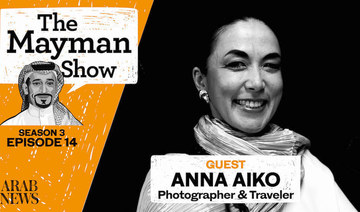RIYADH: Saudi Arabia is transforming at a rapid pace on all fronts, not only in terms of ensuring the empowerment of women, and there is a focus on engaging globally around shared values for a better world.
This is the view of Fatimah Baeshen, the first spokeswoman for the Saudi Arabian Embassy in Washington D.C., who was speaking during a recent interview on Arab News’ podcast, The Mayman Show.
Reflecting on her role as press secretary, she emphasized that it was not solely about being the first female appointment, but rather the manner in which public-sector institutions were being transformed in the Kingdom. This includes women being placed in prominent positions.
Baeshen told Arab News that she believes the country has reached a point where it was not about how others perceived it.
“It’s a matter of cooperation around common interests or common challenges and shared interests. And that’s really it. And that, for me, is a beautiful trajectory,” she said.
Baeshen’s involvement in the media announcements around Vision 2030 and fiscal reforms ignited her interest in pursuing a career in the industry.
She noted the reception of the Kingdom’s messaging on fiscal policy reform in the international media space. She believes many global issues stem from the disconnect between subject-matter experts and communication experts, which leads to a plethora of problems.
When Baeshen became press secretary, she was determined to address what she viewed as persistent biased reporting on the Middle East and North Africa region, including Saudi Arabia. She said that since 2020, there have been rapid changes taking place in the Kingdom.
On the personal front, Baeshen embarked on a new journey during the COVID-19 pandemic. With a background in management consulting, public affairs, and economic development, she wrote the book “140 Life Lessons I Wish I Knew at 20.” This 15-minute read, or audiobook available online, comprises aphorisms, as a collection of pearls of wisdom and guiding principles.
Baeshen found writing it to be cathartic during a time when many were encouraged to self-reflect and unwind.
“At the time when I wrote this, I was 42 and I thought to myself, I wish I knew these in my twenties. And so I don’t have kids. And I thought to myself, this is what I’m going to leave behind,” she said.
For her, some of the most valuable life lessons in the book involve embracing every aspect of oneself. She compares it to the concept of yin and yang, explaining that what may seem wholly negative often contains elements of positivity, and vice versa.
Another lesson she holds dear is the importance of persevering through life’s challenges, to take rest when needed but to keep pushing forward.
One of the most important elements of her book is Lesson 13, which delves into the nuanced differences between self-confidence, self-esteem, and self-assuredness.
She emphasized that it was important that change comes from within. Baeshen said that lacking this internal grounding can lead individuals to seek external validation constantly, trapping them in a cycle devoid of genuine affirmation.
She said that people should encourage and support all contributions to the Kingdom’s long-term goals.
It was important for people to pursue their passions and live holistically, said Baeshen.





























